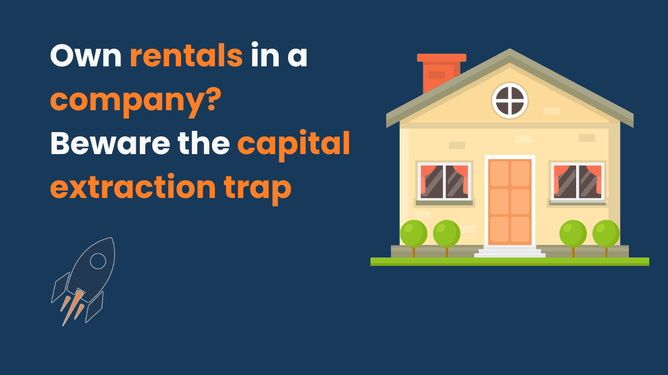If you own multiple properties in an ordinary company structure, you’re at risk of not being able to extract tax free capital gains. When buying property, a small decision today to get the structure right from the start can save tax, admin, and stress later.
What creates the trap?
When a company sells a property outside bright line, the profit usually sits inside the company as a tax free capital gain. That gain is not automatically your personal cash. It belongs to the company.
If you take money out as drawings, the accounting entry goes to the shareholder current account. If your drawings are more than the amount you have put in, the account goes overdrawn. An overdrawn current account is treated as a loan from the company to you.
That loan has to be dealt with. You either repay it with your own after tax money, pay interest and keep it on the books, or clear it by declaring a dividend. Dividends are taxable to you personally. Because capital gains do not generate company income tax, there are usually no imputation credits to attach, so most of the dividend is taxed at your personal rate.
In practice, this can lead to a compounding cycle. You withdraw cash, the account goes overdrawn, interest is required to avoid it being treated as a fringe benefit or deemed dividend, and you still face the issue of how to clear the loan.
The only time a shareholder can usually withdraw capital gains tax free is on a formal company wind up, provided the distribution is correctly documented as a capital distribution rather than a dividend.
For Example:
Long Street Limited bought a house in 2016 for $500,000 using 100% finance. The company sells the property today for $1,000,000 and repay’s $400,000 of the mortgage. On paper, the company has made a $500,000 capital gain.
But the company only owes the shareholder $150,000 (your equity that went into paying the mortgage). The extra $350,000 belongs to the company, not the shareholder.
If the shareholder takes it out, the shareholder current account goes overdrawn. The shareholder must then either pay interest on that loan to the company, or leave the money ($350k) invested inside the company. The capital gain cannot be extracted tax free unless the company is formally wound up and the gain is distributed as capital, not as a dividend.
In practice, this is the heart of the trap. The profit is real, but unless the structure is set up for it, the cash can feel stuck inside the company.
Guide to ownership structure for property
Ordinary companies are excellent for trading businesses, property development, and higher risk activities like building or subdivisions. But they are often not the best vehicle for long term residential property investment, because of the way capital gains can get “stuck” inside the company.
If you are currently in this position, it may be worth having a chat to review your options, especially if you expect further capital gains in the future.
It is true that an ordinary company can provide a short term tax benefit at the 28 percent rate compared to the top personal rate of 39 percent. But in hindsight, the capital gains are often far larger than the operating profits, so the long term extraction problem outweighs the short term tax saving.
Three preventive paths
1. Awareness and hold
Stay in the ordinary company if you plan to reinvest inside the company and do not need personal cash from sales. Review your shareholder current account and drawings. Being aware of this issue now ensures you know what to expect on sale.
2. Restructure now
Move to a flow through structure, such as a look through company (possibly owned by a family trust) or clear joint ownership, before large gains build up. Careful planning is required to avoid triggering bright line or having IRD view it as tax avoidance, so timing and advice are critical.
3. Align the long term strategy
If you are buying again, match the next purchase to the right structure from day one. Use a company for trading and risk. Use a flow through option for long term holds where you may sell and want the flexibility to use the cash personally.
Structure is strategy made visible. Choose the ownership vehicle before you buy your property, and be clear on your plan such as rent, development, build, or AirBnB. Each activity has very different tax treatments.
Next step
If you own property in an ordinary company, let us know if you would like us to review your financial statements and explore your options based on your longer term goals.
Contact Us
Contact us today to discuss on 07 827 9130 or email us. Our office is in Cambridge, NZ, but distance is no problem. We have many international and national clients.
This material has been prepared for informational purposes only, and is not intended to provide, and should not be relied on for, tax, legal or accounting advice. You should consult your own tax, legal and accounting advisors before engaging in any transaction.


